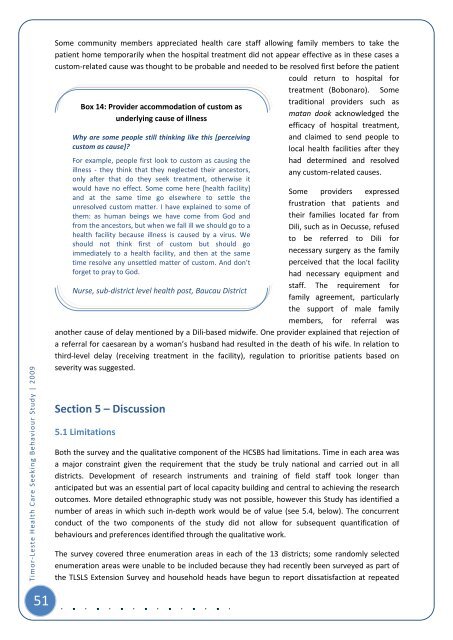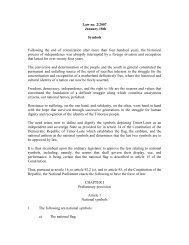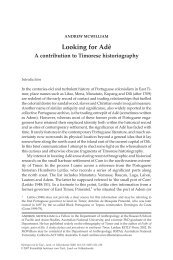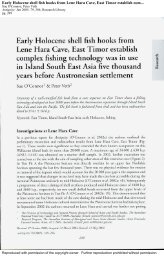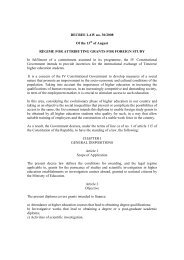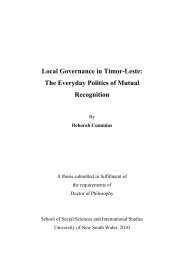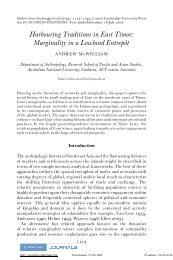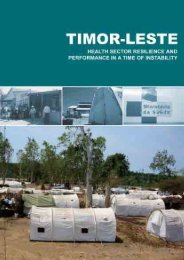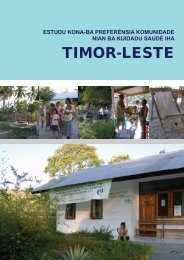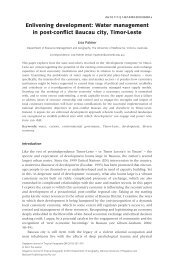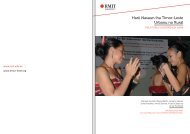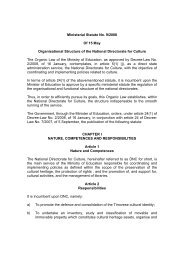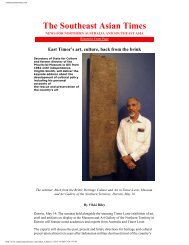<strong>Timor</strong>-<strong>Leste</strong> <strong>Health</strong> <strong>Care</strong> <strong>Seeking</strong> <strong>Behaviour</strong> <strong>Study</strong> | 200951Some community members appreciated health care staff allowing family members to take thepatient home temporarily when the hospital treatment did not appear effective as in these cases acustom-related cause was thought to be probable and nee<strong>de</strong>d to be resolved first before the patientcould return to hospital fortreatment (Bobonaro). SomeBox 14: Provi<strong>de</strong>r accommodation of custom asun<strong>de</strong>rlying cause of illnessWhy are some people still thinking like this [perceivingcustom as cause]?For example, people first look to custom as causing theillness - they think that they neglected their ancestors,only after that do they seek treatment, otherwise itwould have no effect. Some come here [health facility]and at the same time go elsewhere to settle theunresolved custom matter. I have explained to some ofthem: as human beings we have come from God andfrom the ancestors, but when we fall ill we should go to ahealth facility because illness is caused by a virus. Weshould not think first of custom but should goimmediately to a health facility, and then at the sametime resolve any unsettled matter of custom. And don’tforget to pray to God.Nurse, sub-district level health post, Baucau Districttraditional provi<strong>de</strong>rs such asmatan dook acknowledged theefficacy of hospital treatment,and claimed to send people tolocal health facilities after theyhad <strong>de</strong>termined and resolvedany custom-related causes.Some provi<strong>de</strong>rs expressedfrustration that patients andtheir families located far fromDili, such as in Oecusse, refusedto be referred to Dili fornecessary surgery as the familyperceived that the local facilityhad necessary equipment andstaff. The requirement forfamily agreement, particularlythe support of male familymembers, for referral wasanother cause of <strong>de</strong>lay mentioned by a Dili-based midwife. One provi<strong>de</strong>r explained that rejection ofa referral for caesarean by a woman’s husband had resulted in the <strong>de</strong>ath of his wife. In relation tothird-level <strong>de</strong>lay (receiving treatment in the facility), regulation to prioritise patients based onseverity was suggested.Section 5 – Discussion5.1 LimitationsBoth the survey and the qualitative component of the HCSBS had limitations. Time in each area wasa major constraint given the requirement that the study be truly national and carried out in alldistricts. Development of research instruments and training of field staff took longer thananticipated but was an essential part of local capacity building and central to achieving the researchoutcomes. More <strong>de</strong>tailed ethnographic study was not possible, however this <strong>Study</strong> has i<strong>de</strong>ntified anumber of areas in which such in-<strong>de</strong>pth work would be of value (see 5.4, below). The concurrentconduct of the two components of the study did not allow for subsequent quantification ofbehaviours and preferences i<strong>de</strong>ntified through the qualitative work.The survey covered three enumeration areas in each of the 13 districts; some randomly selecte<strong>de</strong>numeration areas were unable to be inclu<strong>de</strong>d because they had recently been surveyed as part ofthe TLSLS Extension Survey and household heads have begun to report dissatisfaction at repeated
survey activity with little discernible improvement in services. The interviewers were not always ableto access both a man and woman in every house, due to absence of household members andrestricted opportunities for prior communication about interviewer visits. The response rate forindividual interviews (69% for women and 63% for men) was below the target rate of 80% but was<strong>de</strong>emed acceptable given the resource and logistic constraints.Some FGDs were not as effective as others; in particular those with adolescent and unmarriedwomen proved somewhat disappointing. In <strong>Timor</strong>, few young women have had the opportunity toshare their i<strong>de</strong>as or experiences in a group. They are thus somewhat shy in situations of groupdiscussion; all the more so where some of the topics may be <strong>de</strong>emed personal and sensitive.Midway through qualitative data collection, the criteria for women’s FGDs was altered to targetmarried and adolescent women with previous experience with groups (e.g. church or youth groups).An effort was still ma<strong>de</strong> to ensure that such women were no more educated or had any specialstatus relative to other women in the community.Two additional factors may have affected women’s participation. First, xefe suco ten<strong>de</strong>d to <strong>de</strong>legate,rather than to invite, FGD participation, thus making it difficult for them to <strong>de</strong>cline. Second, marriedwomen in rural areas are not necessarily fluent in Tetum, as their activities tend to be more localisedthan men and conducted in the local language. Use of skilled local interpreters to routinely interpretall FGD questions and probes, as well as all responses from FGD participants, would have allowedwomen to contribute in their local language. While such a person was on hand for all FGDs, they onlyinterpreted when requested to do so by participants, rather than routinely throughout thediscussion.Although 21 government/NGO health service provi<strong>de</strong>rs, 8 traditional provi<strong>de</strong>rs and 2 others(kiosk/pharmacy) were interviewed, this represents relatively few in any particular category. Thestudy was unable to give <strong>de</strong>tailed attention to any particular category of health care provi<strong>de</strong>r: TBAs,Cuban doctors, pharmacists, midwives, PSFs and others – all of whom would benefit from furtherexamination and analysis.A number of health sector initiatives are currently un<strong>de</strong>rway in <strong>Timor</strong>-<strong>Leste</strong>; this research provi<strong>de</strong>ssome insights into many of these initiatives but is not focused on any one intervention. SISCaactivities, for example, are only beginning to be more structured and organised. Although the HCSBS<strong>de</strong>monstrates the value of initiatives directed at the interface between community and healthservice, the <strong>Study</strong> was not geared to evaluating this unfolding program.5.2 Reflections on findings relative to what is knownThe HCSBS was <strong>de</strong>signed to build on previous research in <strong>Timor</strong>-<strong>Leste</strong>, adding <strong>de</strong>pth to availableknowledge and insights regarding health care seeking, particularly in rural areas with limited accessto hospitals, and drawing on and contributing international literature in this field. From the outset,we en<strong>de</strong>avoured to give due consi<strong>de</strong>ration to the collective element of health seeking behaviour andthe interaction between individual, society and health systems, as well as the socio-cultural andlinguistic complexity present in <strong>Timor</strong>-<strong>Leste</strong>. This report provi<strong>de</strong>s an overview of some of the mainfindings; additional <strong>de</strong>tails will be provi<strong>de</strong>d in subsequent peer-reviewed publications.The HCSBS emphasises the role of the family and community in <strong>de</strong>cisions to seek health care, andaround the issue of birth spacing. It also highlights the <strong>de</strong>gree to which cultural beliefs, attitu<strong>de</strong>s and<strong>Timor</strong>-<strong>Leste</strong> <strong>Health</strong> <strong>Care</strong> <strong>Seeking</strong> <strong>Behaviour</strong> <strong>Study</strong> | 200952


